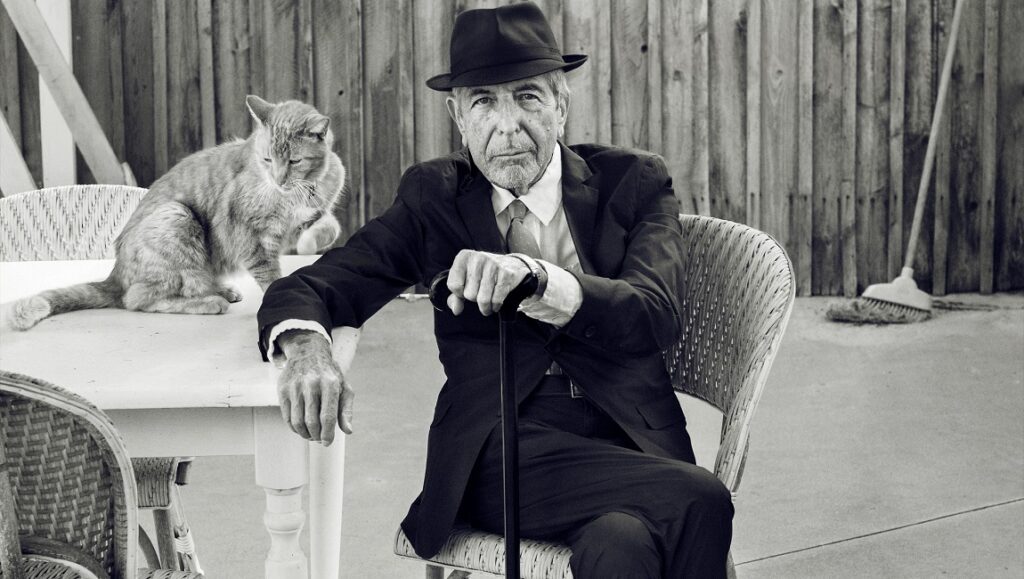Hallelujah doesn’t quite strike the right balance between portrait of the artist and myth of the song, but its littered pleasures will likely still be enough for plenty of viewers.
It’s not uncommon that an artist’s entire professional career might be most widely understood, or you could say majestically reflected, through a single work. But what is unusual is the case of an artist’s chef-d’œuvre finding limited initial footing with the layperson, only to find increasing recognition and popularity across the succeeding decades thanks to the work of other artists. Dayna Goldfine & Dan Geller’s bio-doc Hallelujah: Leonard Cohen, A Journey, A Song shapes itself around this particular history. As the title explicitly suggests, the film tells the story of a journey of both a song and a songwriter, and how their respective “lives” have been entangled in the larger cultural consciousness. Leonard Cohen should be no stranger to music lovers: a musician, poet, and distinctively low-pitched crooner whose enigmatic, almost hermetic character meant that he voluntarily remained at the margins of the music industry, his deeply spiritual journey often articulated in his work but existent outside of the spotlight of fame and fortune. Cohen, who was born and raised in a privileged Quebecois, Jewish family, developed his interest in writing songs and poems fairly late in life relative to contemporaries — in his early-30s — and after embarking on his musical career, became known both as a “ladies’ man” and a man of faith (he even retreated for some years to a Zen center atop Mt. Baldy). Many of his tracks would go on to metaphorically meld these realms of flesh and soul, nowhere more perfectly epitomized than in his universal mega-hit “Hallelujah,” an epic ballad that took Cohen seven years to finalize after undergoing nearly 80 drafts and hundreds of various versions for every single line.
But in 1984, with the highly-anticipated U.S. release of Cohen’s seventh studio album Various Positions (on which “Hallelujah” first appeared), the president of Columbia Records, Walter Yetnikoff, decided that the record wasn’t commercially viable and refused to distribute it. As a result, the album wasn’t released in the U.S. until 1985, eventually picked up by obscure independent label Passport, but it remained vastly unheard at large, despite early recognition by another legendary singer-songwriter by the name of Bob Dylan. Detailing all of this, Goldfine & Geller’s Hallelujah is constructed from a rich various collection of archival footage (both audio and video interviews with Cohen, live performances, unseen photographs, and other assorted clips) and, of course, a variety of talking-head dialogues with friends and collaborators: most notably, Judy Collins, Sharon Robinson, Rolling Stone journalist Larry “Ratso” Sloman, former partner Dominique Issermann, and producer John Lissauer, among many others. The film is realized in four chapters — “Birth of a Poet,” “The Holy and the Broken,” “The Secret Chord,” and “The Minor Fall, The Major Lift” — and an epilogue, all of which chronicle the life and career of Cohen according to a very familiar rise-and-fall narrative structure, straightforward but precisely executed, detailing his rise to stardom, his later days’ re-evaluations (followed by a successful world tour), and his death at the age of 82 in 2016.
It’s perhaps easy to predict that such a film would offer plenty of interesting fandom material and revelatory moments — and it does — but Hallelujah‘s frequent inefficiencies are largely due to the fact that Goldfine and Geller don’t always succeed at striking a careful balance, particularly in their approach to distributing a vast amount of information. Across the two-hour runtime, they seem to cycle through certain periods and plotlines too quickly, while at other times emphatically bolding other facets of the film and upsetting its pacing. Almost everything presented is compelling when taken on their own terms, but it’s the loose correlation of all this material, the directors’ inability to convey a cogent throughline, that causes the film to feel somewhat scattered and repetitive when regarded as a whole. That’s to say, Hallelujah can sometimes feel confused: there’s not a clear governing logic in how to present L. Cohen’s career writ large alongside the more specific story behind the film’s eponymous track, most noticeably felt during the third chapter which focuses on the song’s covers by John Cale, Jeff Buckley, and Rufus Wainwright’s pared-down, PG-version from the Shrek soundtrack that proved most ubiquitous for a global audience. Amidst all this, Cohen can begin to feel lost within the film, or at least out of focus: as a biopic, Hallelujah is likely to leave some viewers — particularly those who consider themselves Cohen diehards — wishing for a denser portrait of the artist, one that, even if unintentionally, doesn’t reduce his legacy and colorful musicianship to one-hit-wonder territory, and which leverages this hook to more penetrating ends. In one of his last interviews, Cohen articulated the importance of taking risks — especially during live performances — in order to gift audiences with a unique experience and to be able to “really stand at the center of your song… and stand for the complexities of your emotions.” Unfortunately, it would be disingenuous to suggest that Hallelujah: Leonard Cohen, A Journey, A Song tends toward such risk-taking, even as the Cohen songs that we hear in the film intimate that kind of emotional and artistic complexity. Hallelujah still affords its target audience, and hopefully some beyond, with a pleasantly safe journey, charting a course to at least sufficiently (re)appreciate the man behind “the song,” and hits mostly right notes in the process, even if it fails to engage any deeper exploration of the secret chord that drove Cohen.


Comments are closed.